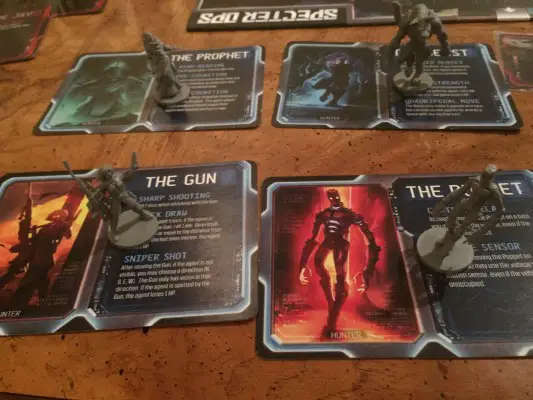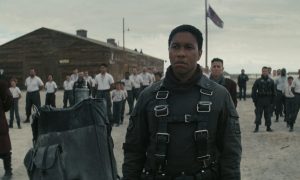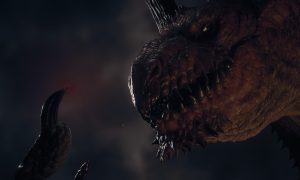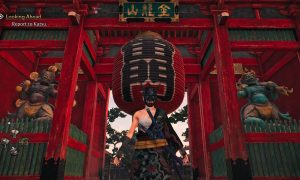Specter Ops: Shadow of Babel is a hidden movement game for 2-5 players. It was designed by Emerson Matsuuchi, as the first collaboration between his company Nazca Games and Plaid Hat Games. In this stealth-style game, one player plays as an Agent who tries to infiltrate the mega-corporation Raxxon, while 1-4 other players are Hunters sent to track down and kill the Agent. (If you know Dead of Winter, Raxxon Pharmaceuticals started the zombie apocalypse in that game.) However, instead of moving along the board, the Agent moves secretly, marking their movements on a separate movement sheet. The Hunters only get clues as to where the Agent is based on when the Agent crosses their line of sight.
Every round the Agent can move up to four spaces including diagonals, and then the Hunters decide turn order amongst themselves, each able to move up to four spaces including diagonals. Yet, the Hunters and the Agent play a very different game. The Hunters play a game of deduction and teamwork. The Hunters need to track down and kill the Agent. The Hunters know where the Agent starts, but after the Agent’s first turn the Hunters must rely on deduction and strategic uses of their lines of sight. Hunters have line of sight down the rows and columns they are on; if they are on a road (two rows or columns separated by a dotted line), they can see down the entire road. Hunters can never see diagonally or through structures. The Agent must tell the Hunters where they cross the Hunters’ line of sight, placing a last seen token and revealing their character. If they crossed at multiple points, the Agent only indicates the last spot they crossed line of sight. These clues help the Hunters track down the Agent. If a Hunter can see the Agent at the end of that Hunter’s movement, the Hunter gets a chance to attack. Attacks are resolved using one die and the Agent takes one wound if the number rolled is greater than or equal to the number of spaces the Agent is from the Hunter. A result of 1 is always a miss, and a result of 6 is re-rolled with the two numbers being added together. If a Hunter shares a space with the Agent, the Agent automatically takes a hit. HP varies based on player count, but, if the Agent is ever reduced to zero HP, the Hunters win the game.
The Hunters also have access to a car. The car can move along the roads up to 10 spaces per round, which can be broken up between the Hunters’ turns. Whenever a Hunter enters or exits the car, their movement immediately ends. While in the car, the Hunters still have line of sight but cannot attack. Also while in the car, if the car has not moved that round, a Hunter can activate the motion sensor. If the Agent moved more than two spaces last turn, the Agent player has to tell the Hunters where the Agent is relative to the car when the motion sensor is activated.
The Hunter players have the choice of four different Hunters. There is the Gun who is the most offensive. She is able to easily make ranged attacks, rolling two dice when attacking during her turn; whenever the Agent passes the Gun’s line of sight during the Agent turn, the Gun attacks using one die. The Beast is also rather offensive as he can move up to five spaces and can potentially inflict two wounds when landing on the same space as the Agent. However, when moving five spaces, he can only attack if he lands on the Agent’s space. Also, when the Beast moves three or less spaces, the Agent player is forced to say whether or not the Agent is within four spaces of the Beast. There is also the Prophet. He is more support-oriented, as he forces the Agent player to declare a turn ahead when they are going to complete an objective and can ask the Agent where they were two turns ago. However, the Prophet is also a decent attacker as all his die-rolls are increased by two (1’s still count as auto-misses). Finally there is the Puppet. The Puppet is very support-oriented, as he can move the car or activate the motion sensor without being in the car. Believe me, his ability is incredible. If the Puppet is not in play, the car is often in an inconvenient location.
On the other hand, the Agent is playing a game of stealth. On the board there will be four objectives randomly determined by die-roll, and the Agent needs to complete three of these objectives and escape before round 40. In order to complete an objective, the Agent must start their turn adjacent to an objective. If so, they can flip or complete it and then take their move. The Agent needs to sneak around the Hunters to give as few clues as possible, yet also be faster than the Hunters. Ideally they only give last seen tokens when the Hunters can’t catch up to them or when the last seen token gives the Hunters imperfect information. However, the Agent will eventually become cornered. During the game the Agent has access to a limited number of equipment cards. There is a great variety of equipment cards included in the game, and they offer the agent some hidden tricks to get out of tight situations. For example, some of the cards impair with line of sight, others stun the Hunters, and others let the Agent move further. Each Agent also has access to a unique equipment card that helps shape their strategy.
The Agent player can choose between four different Agents. First, the Agent can pick Blue Jay whose ability allows her to complete objectives from two spaces away, instead of one. Her piece of equipment allows her to place a last seen token four spaces away from her at the end of her movement, even if she did actually cross line of sight. Second, there is the Orangutan, who has two additional HP. His special equipment can be used twice and allows him to stun all Hunters within two spaces. Third, there is the Spider, who reduces Hunters’ attack rolls by 2 when she is within three spaces, which makes her harder to hit. Her equipment allows her to potentially stun a Hunter in her line of sight by rolling a die and meeting the distance between them, and if her roll fails she does not use one of the two charges on it. Finally, there is the Cobra. If a Hunter lands on the same space as the Cobra, the Hunter is automatically stunned and cannot attack, and, if a Hunter ends orthogonally adjacent to the Cobra, the Cobra can roll a die to potentially stun that Hunter before it can attack. The Cobra’s two-time use equipment allows him to reduce attack rolls against him by 3.

On top of all the variety in characters and equipment, the game also feels very different depending on the player counts. In a 2-player game, there are three exits, the Agent has four HP (six for the Orangutan) and three equipment cards, and the other player controls two Hunters. The 2-player game is my preferred way to play Specter Ops, as it is a battle of the minds.
The 3-player rules are identical to the 2-player rules, except there are two Hunter players and each controls one Hunter. Unfortunately, the 3-player game is the weakest of the player counts, and it has a possible balance issue. It is difficult to play as the Hunters in this version, as they need to be absolutely in sync to win. I would not recommend this version for new players.
The 4-player game features one Agent against three Hunters. The Agent has four exits, six HP (eight for the Orangutan), and five equipment cards, also the placement of the objectives are known only to the Agent. This is potentially the tensest version of the game because the Hunters have to lock down on the Agent quickly, but the seemingly endless equipment cards make the Hunters more cautious. The Agent is also stressed, feeling constantly surrounded, searching for the weakest link among the Hunters to exploit their openings.
In the 5-player game, the Agent has four HP (six for the Orangutan), three equipment cards, and three exits, but one of the Hunters is also a traitor. The Agent chooses the traitor, and only that Hunter and the Agent know who the traitor is. The Agent does not have to be honest to the traitor and can choose not to place last seen tokens when crossing the traitor’s line of sight. This creates a new tension as the Hunters bicker among themselves, struggling to figure out who let the Agent by. It possibly to difficult to expose a traitor, but if routed, the traitor gains a movement sheet and becomes an Agent. If either Agent dies, the Agents lose. This version is a lot of fun and is a refreshing take on the traitor mechanic. However, not all players will enjoy playing as the traitor because is not always obvious how they can help the Agent, even though the traitor will end up helping the Agent immensely.
I love Specter Ops. If you are not interested in a deduction game or a hidden movement game, you probably will not enjoy Specter Ops. Also, if you enjoy calculating every move, Specter Ops may stress you out because it is a fast-paced game. But if the elevator pitch for Specter Ops interests you even in the slightest, I am certain you will like this game. Nearly everything about this game is positive for me.
First, the board is fantastic. The artwork is gorgeous, and the layout and placement of obstacles was very intelligently done. One possible con is that in low visibility, some of the numbered tiles are hard to read. However, the inclusion of the movement sheets prevents that from being too big of an issue. The movement sheets were an incredible add-on for this game. They really prevent you from giving away any visual cues and make movement easier for the Agent.
The art and components are also fantastic, really allowing the theme to shine. The miniatures are just phenomenal and incredibly detailed. The models seem very durable, but the Spider, the Gun, and the Cobra should be put in protective cases (I use plastic dice boxes) because of how intricate they are. Like all products from Plaid Hat Games, Specter Ops is a great value. The replayability included in this box is simply amazing. The differences among the Hunters, Agents, and equipment, let alone the differences in play style or strategies, will keep this game fresh for a long time. I would love to see expansions with more Hunters, more Agents, and more equipment. The theme shines through and makes me think of video games like Metal Gear Solid. I also love that it is not clear which team is good and which team is bad; players develop real attachment to their characters.
The game play is also incredible. Mr. Matsuuchi did an incredible job in making a fast past deduction game. At its core this is a deduction game, but it is in no way bogged down by analysis paralysis. You need to think, but you also have to be fast about it. In this game you have a very difficult time balancing your instincts and your deduction capabilities. Your decisions are always difficult, yet the rules are simple to teach. On top of that, this game is just plain fun. The different powers, the theme, and the mechanics create a game that flies by and sucks you in, making you hungry for many more plays.
Finally the fact that every player count feels different is a big plus. There are some concerns that the 3-player game needs two very experienced Hunters and also that many players would not enjoy playing as the traitor. However, besides for these minor concerns, the game scales well and is balanced throughout. The Hunters will scratch their heads trying to find the Agent, while the Agents will be stressing because the Hunters are nearby. Yet, both sides can win.
I do have two concerns, but both should be corrected with time. First, the rulebook is very short, using cards to relay all the minor rules. Unfortunately, there are several ambiguities on the cards, and, while the FAQ is good, it is not yet complete. Some things will have to be house ruled until that is expanded upon. Second, occasionally the Agent player will make a mistake and accidentally not declare something they were supposed to declare. The moves can be checked afterwards, but this can be a detriment to the gameplay. However, there has been talk of a companion app from Specter Ops, which would help with those inevitable mishaps.
Specter Ops: Shadow of Babel
Designed by: Emerson Matsuuchi
Published by: Nazca Games/Plaid Hat Games
Players: 2-5
Time: 60-120 Minutes
Mechanics: Hidden movement, Variable Player Powers
Weight: Medium-Light
MSRP: $49.95

Specter Ops is not for everyone, but, if the idea of a fast-paced hidden movement game intrigues you, I am certain that you will like Specter Ops. It is an incredibly well-designed game that manages to balance deduction with fast game play full of tough decisions. It is immensely fun and one of the more interesting games I’ve ever played.
PROS
- Needs instinct and deduction
- Fast-paced, tense gameplay
- Replayability
- Art and components
- Balance and scalability
CONS
- Rule ambiguities
- Possibility of accidental errors
- 3-player game needs very experienced players




 Buy Now
Buy Now
 Buy Now
Buy Now
 Buy Now
Buy Now
 Buy Now
Buy Now
 Buy Now
Buy Now
 Buy Now
Buy Now















